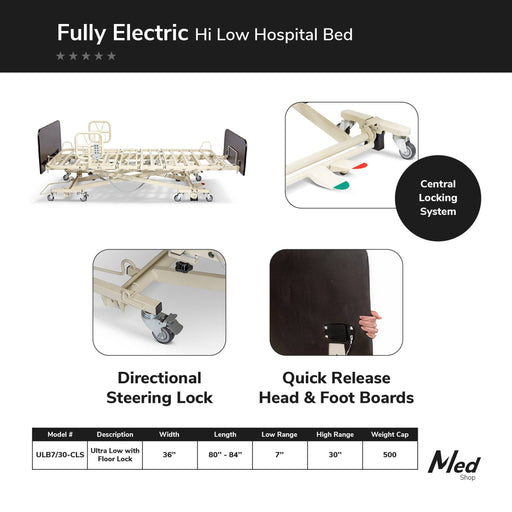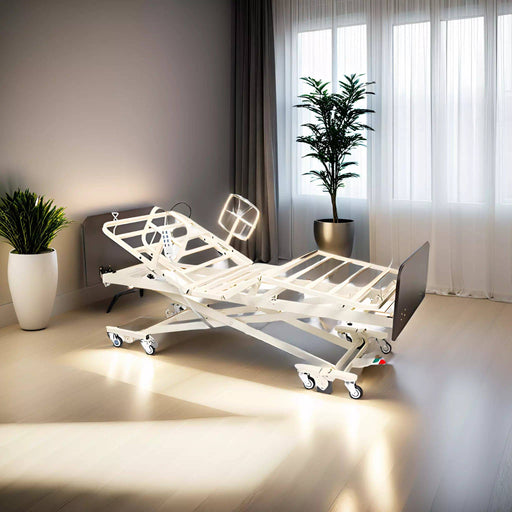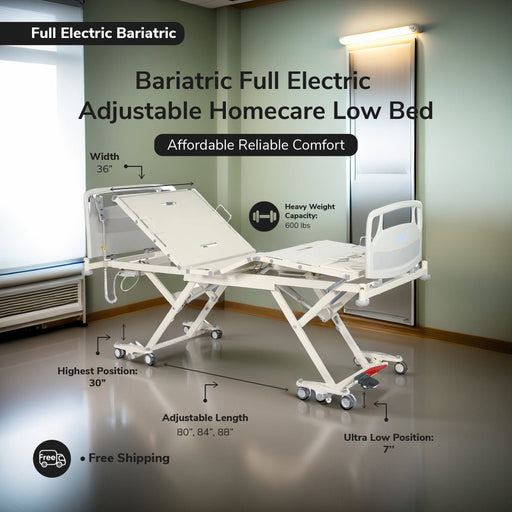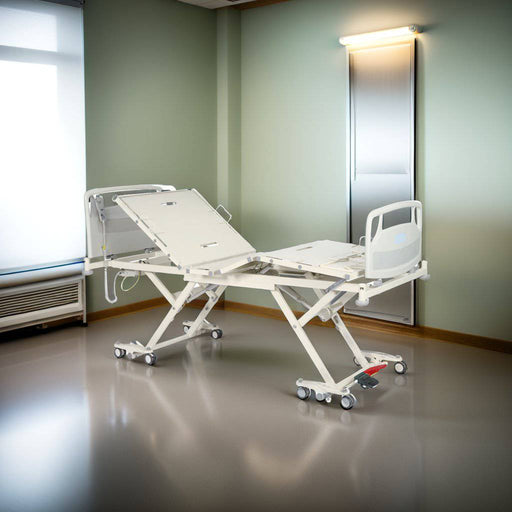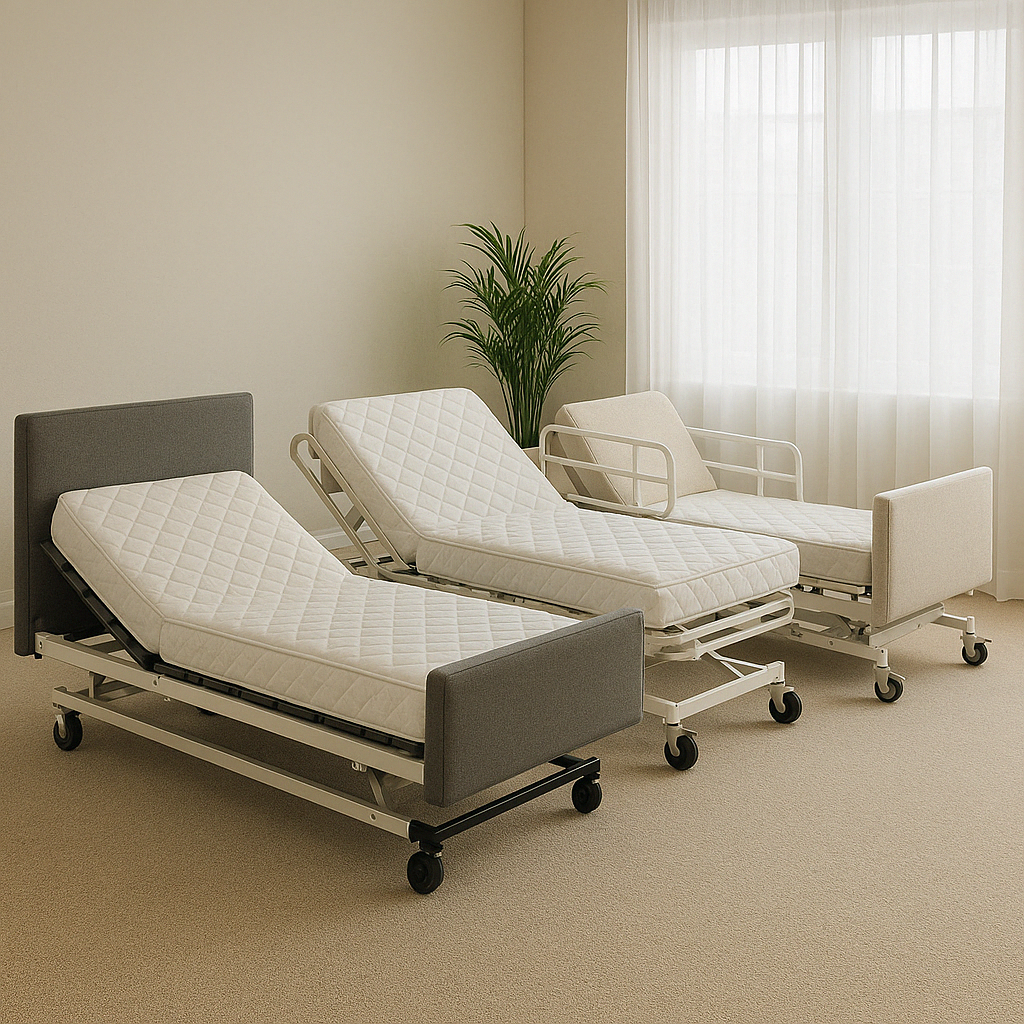
Hospital Bed Buying Guide: Top 3 Home Care Beds 2025
📋 KEY TAKEAWAYS
| Feature | Importance | Considerations |
|---|---|---|
| Adjustability | Essential | Manual, semi-electric, or full electric options |
| Height Range | Critical for safety | Ultra-low (7"-9") to high (26"-30") |
| Weight Capacity | Safety requirement | Standard (450 lbs) to bariatric (750+ lbs) |
| Side Rails | Safety feature | Full-length, half-rails, or assist bars |
| Price Range | Budget factor | $1,000-$5,000+ depending on features |
Best Overall: Icare High Low Hospital Bed IC222 – Premium features with residential styling
Best Value: Costcare Full Electric Hospital Bed B135C – Full functionality at moderate price
Best Bariatric: Medacure Bariatric Adjustable Bed Lincoln LX-BARI-S – Built-in scale and high capacity
This hospital bed buying guide helps you navigate the essential features, options, and considerations when selecting a medical bed for home care.
With various models available in the medical beds marketplace, finding the right hospital bed requires understanding specific needs, features, and budget considerations.
We've analyzed the top options for 2025 to identify the best choices for different care requirements and living situations.
Types of Hospital Beds for Home Care
Hospital beds come in several configurations, each designed for specific care needs and budgets.
Manual Hospital Beds
Manual beds use hand cranks for position adjustments:
- Pros: Lower cost ($800-$1,200), no electricity required, simple maintenance
- Cons: Requires physical effort to adjust, caregiver assistance needed
- Best for: Temporary use, limited budget, infrequent adjustments
Semi-Electric Hospital Beds
Semi-electric beds offer electric head/foot adjustment with manual height control:
- Pros: More affordable than full-electric ($1,000-$1,800), patient independence for position changes
- Cons: Still requires manual effort for height adjustments
- Best for: Budget-conscious buyers who need easy position adjustments
The Costcare Semi-Electric Bed B120C at $1,068 offers an excellent balance of features and value with electric head and foot adjustments while maintaining a reasonable price point.
Full-Electric Hospital Beds
Full-electric beds provide motorized control of all functions:
- Pros: Complete motorized adjustment, maximum independence, easier for caregivers
- Cons: Higher cost ($1,200-$3,500), requires electricity, more mechanical components
- Best for: Long-term care, patients with limited strength, frequent adjustments
The Costcare Full Electric Hospital Bed B135C at $1,298 provides complete electric functionality with a user-friendly remote control, making it our best value recommendation for full-featured electric beds.
Bariatric Hospital Beds
Bariatric beds are reinforced for higher weight capacities:
- Pros: Support for larger individuals (500-1000 lbs), extra width options, enhanced durability
- Cons: Higher cost ($2,000-$5,000+), larger footprint, heavier components
- Best for: Users over 350 pounds, those needing wider sleeping surfaces
For specialized needs, heavy-duty medical beds provide necessary support and safety features for larger individuals.
The Medacure Bariatric Adjustable Bed Lincoln LX-BARI-S at $3,495 features an integrated scale system and supports up to 750 pounds, making it our top bariatric recommendation.
Key Features to Consider When Buying
Understanding these critical features will help guide your hospital bed purchase decision.
Adjustable Height Range (Hi-Lo Function)
The height adjustment capability serves multiple purposes:
| Height Range | Benefits | Best For |
|---|---|---|
| Ultra-Low (7"-9") | Minimizes fall injury risk, easier floor transfers | High fall risk patients, dementia care |
| Low (12"-15") | Safe transfers, moderate fall protection | Most home care situations |
| High (26"-30") | Reduces caregiver strain, easier care delivery | Situations requiring frequent care |
| Wide Range | Maximum versatility for changing needs | Long-term care situations |
The Ultra Low Hospital Bed Medacure ULB3.9 features an exceptionally low 3.9" minimum height, making it ideal for fall prevention in high-risk individuals.
Side Rails and Safety Features
Side rails provide fall protection and mobility assistance:
- Full-length rails: Maximum protection for high fall risk
- Half-rails: Balance between protection and independence
- Quarter rails/assist bars: Primarily for repositioning help
- No rails: Maximum independence for low-risk users
Various safety rail options can be added to most hospital beds based on individual needs and safety requirements.
Weight Capacity Requirements
Selecting the correct weight capacity ensures safety and durability:
- Standard hospital beds: 350-450 pounds
- Heavy-duty beds: 500-600 pounds
- Bariatric beds: 600-1000+ pounds
Always choose a bed with at least 50-100 pounds of additional capacity beyond the user's current weight.
Positioning Capabilities
Different positions provide therapeutic benefits for various conditions:
- Head elevation: Assists with breathing, GERD, swallowing (0-70°)
- Foot elevation: Helps with edema, circulation (0-40°)
- Trendelenburg: Medical position with feet above head for circulation
- Reverse Trendelenburg: Head above feet for respiratory support
- Cardiac chair: Specialized position for heart conditions
The Trendelenburg Costcare Adjustable Medical Bed B337 at $1,675 offers specialized positioning options for specific medical needs.
Top 3 Hospital Beds for 2025
After extensive testing and evaluation, these three hospital beds represent the best options for home care across different needs and budgets.
Best Overall: Icare High Low Hospital Bed IC222
Price: $2,800-$5,400 (depending on configuration)
Why it's our top pick:
- Exceptional balance of medical functionality and residential aesthetics
- Premium construction quality with 450 lb weight capacity
- Full electric operation with intuitive controls
- Hi-Lo functionality with wide height range
- Residential styling that blends with home décor
Ideal for: Long-term care situations requiring both functionality and appearance, users wanting a less institutional look, and situations where both safety and comfort are priorities.
What could be better: Premium price point may exceed some budgets.
Best Value: Costcare Full Electric Hospital Bed B135C
Price: $1,298
Why it offers excellent value:
- Full electric functionality at a moderate price point
- Complete head, foot, and height adjustability
- 450 lb weight capacity
- User-friendly remote with backlit buttons
- Compatible with standard accessories
Ideal for: Budget-conscious buyers who need complete electric functionality, standard-sized users, and typical home care situations.
What could be better: Basic appearance compared to premium models, fewer specialized features.
Best Bariatric: Medacure Bariatric Adjustable Bed Lincoln LX-BARI-S
Price: $3,495
Why it's the best bariatric option:
- 750 lb weight capacity with reinforced frame
- Built-in scale system for weight monitoring
- Expandable width options (36", 42", 48")
- Full electric operation
- Heavy-duty components for durability
Ideal for: Larger individuals, situations requiring weight monitoring, and users needing extra width for comfort.
What could be better: Substantial size and weight make installation more challenging.
Mattress Considerations for Hospital Beds
The right mattress is essential for comfort and therapeutic benefits.
| Mattress Type | Price Range | Best For |
|---|---|---|
| Standard Foam | $200-$400 | Short-term use, budget options |
| Memory Foam | $400-$900 | Comfort priority, moderate pressure relief |
| Alternating Pressure | $800-$1,500 | Pressure ulcer prevention, extended bed time |
| Low Air Loss | $1,200-$2,000 | Temperature regulation, moisture control |
Important considerations for medical mattress selection:
- Must be designed to flex with bed articulation
- Should match the bed dimensions exactly
- Need appropriate firmness for user's condition
- Should include waterproof covering for protection
- Must support proper weight distribution
Cost and Insurance Considerations
Understanding the financial aspects of hospital bed purchases:
Price Ranges
- Manual hospital beds: $800-$1,200
- Semi-electric beds: $1,000-$1,800
- Full-electric beds: $1,200-$3,500
- Bariatric beds: $2,000-$5,000+
- Specialty beds: $3,500-$10,000+
Additional costs include:
- Mattress: $200-$2,000
- Side rails (if not included): $100-$300 per pair
- Delivery and setup: $0-$350
- Extended warranties: $200-$500
Medicare and Insurance Coverage
Medicare Part B typically covers 80% of the approved amount for medically necessary hospital beds when:
- Prescribed by a doctor
- Required for a specific medical condition
- For use in the home
- Provided by a Medicare-approved supplier
Documentation needed includes:
- Doctor's prescription with medical justification
- Face-to-face evaluation
- Detailed written order
Installation and Setup Considerations
Proper installation ensures safety and functionality:
- Space requirements: Allow 3-4 feet clearance on all sides
- Doorway access: Typically need 32-36" clearance for delivery
- Electrical needs: Grounded outlet nearby
- Floor protection: Consider protective pads for hard floors
- Assembly: Most beds require some assembly
Professional setup services are recommended for:
- Bariatric beds due to weight and complexity
- Users with immediate critical needs
- Complex therapeutic systems
- Situations without capable assistance
Frequently Asked Questions
How do I know if I need a full-electric or semi-electric hospital bed?
Choose full-electric if the user needs independent height adjustment or has limited strength. Semi-electric works for those who only need occasional height changes with caregiver assistance.
Will Medicare cover the cost of a hospital bed for home use?
Medicare covers 80% of approved costs when the bed is medically necessary, prescribed by a doctor, and purchased through an approved supplier. Documentation requirements apply.
What's the difference between a hospital bed and an adjustable bed?
Hospital beds have medical-grade features including height adjustment, medical rails, and clinical positioning. Adjustable beds lack these medical features and typically don't qualify for insurance.
How much space do I need for a hospital bed?
Standard hospital beds measure approximately 36" wide by 80" long. Allow at least 3 feet of clearance on both sides and the foot of the bed for caregiver access and transfers.
What safety features should I prioritize when buying a hospital bed?
Focus on height adjustability (for fall prevention), secure side rails, locking wheels, emergency controls, and weight capacity appropriate for the user.
Can hospital beds be made to look less institutional?
Many modern hospital beds offer decorative headboards, footboards, and bed skirts to blend with home décor. Some brands specialize in residential-looking medical beds.
What mattress size do I need for a hospital bed?
Most hospital beds require 36" x 80" mattresses, though bariatric beds may need 42"-60" widths. Always match the mattress to your specific bed's dimensions.








